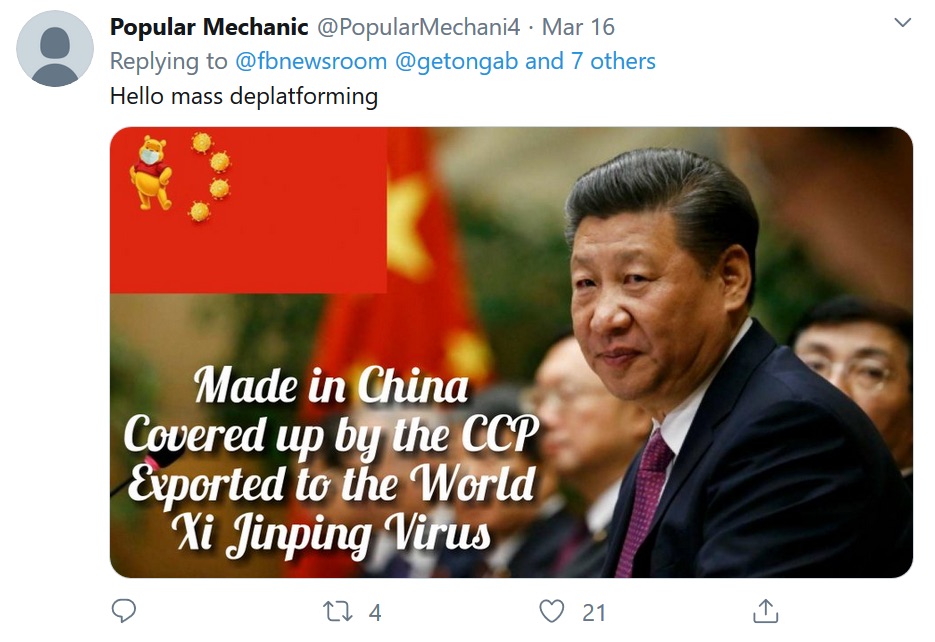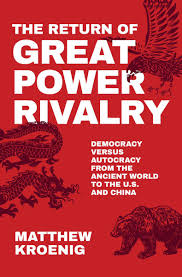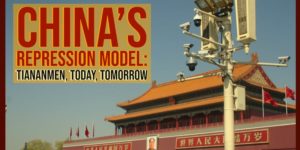
Wikipedia
The COVID-19 crisis reveals that the world is a competitive arena in which great power rivals like China seek advantage, that the state remains the irreplaceable agent of international power and effective action, that international institutions have limited capacity to transform the behavior and preferences of states, argues Nadia Schadlow, former deputy national-security adviser for strategy.
The coronavirus experience demonstrates that economic interaction does not occur in a vacuum of geopolitical competition, she writes for The Atlantic:
Dependence on China for crucial medical equipment throughout the pandemic has illuminated the dangers of a hyper-globalized economy. Experts had warned of American dependence on key drug ingredients from China. The Wall Street Journal has reported that China is the only maker of key ingredients for certain classes of drugs, including established antibiotics that treat a range of bacterial infections such as pneumonia. American reliance on Chinese suppliers for other pharmaceuticals and medical supplies is also worrisome. Americans should not depend on an authoritarian rival state for its citizens’ health—any more than the United States and other free and open societies should give Chinese companies, and by extension the Chinese Communist Party, control over communications infrastructure and sensitive personal data.
 One of the big questions coming out of the coronavirus crisis will be which model performs better – the U.S. model of open market democracy or the Chinese authoritarian, state-led capitalist model, notes Dr. Matthew Kroenig, deputy director of the Scowcroft Center for Strategy and Security at the Atlantic Council, and the author of The Return of Great Power Rivalry: Democracy versus Autocracy from the Ancient World to the U.S. and China.
One of the big questions coming out of the coronavirus crisis will be which model performs better – the U.S. model of open market democracy or the Chinese authoritarian, state-led capitalist model, notes Dr. Matthew Kroenig, deputy director of the Scowcroft Center for Strategy and Security at the Atlantic Council, and the author of The Return of Great Power Rivalry: Democracy versus Autocracy from the Ancient World to the U.S. and China.
The answer to this question will have significant implications for which system looks more attractive to other nations around the world in the coming years, he tells International Policy Digest:
Some of the early initial assessments seem to have concluded that China has performed better, but my book shows that democracies tend to outperform autocracies in great power rivalry. I suspect, therefore, that with the benefit of hindsight, we will assess that the U.S. response, even though it has been halting and patchwork, will produce the more effective outcome at home and for U.S. international leadership abroad. We are already seeing evidence that this is the case with China’s domestic and international response now looking much more feeble than it did just a week or so ago.
How to Make China Pay

National Endowment for Democracy
The U.S. and its allies could strike at the heart of the Chinese Communist Party’s (CCP) claim to a mandate from heaven by further ratcheting up the pressure on Beijing to adopt a more cooperative, transparent stance on public health by imposing economic sanctions and inflicting serious economic harm on China, analyst Gordon Chang writes for the National Review:
The Trump administration could enhance its efforts to exclude China from buying and selling advanced technologies, such as microchips, artificial intelligence, or biotechnology. It took an important step in that direction this week by implementing new measures on chip exports to Huawei. In addition, the U.S. should use targeted sanctions on specific CCP leaders and their supporters by freezing their assets and prohibiting their travel. The administration needs to impose pain on CCP supporters so that they will want to change policy to alleviate their own economic losses.
 While many in the foreign-policy community “put great stock in the ability of multilateral and international organizations to constrain the misbehavior of China and other states” and “tend to view them mainly in their idealized form and as the central instruments to solve global problems and advance values shared by all,” adds the Hudson Institute’s Schadlow, a board member of the National Endowment for Democracy (NED). “In practice, though, how international organizations perform is profoundly influenced by power relationships among member states.” RTWT
While many in the foreign-policy community “put great stock in the ability of multilateral and international organizations to constrain the misbehavior of China and other states” and “tend to view them mainly in their idealized form and as the central instruments to solve global problems and advance values shared by all,” adds the Hudson Institute’s Schadlow, a board member of the National Endowment for Democracy (NED). “In practice, though, how international organizations perform is profoundly influenced by power relationships among member states.” RTWT







